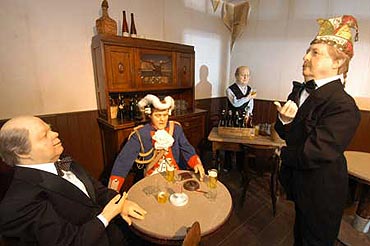Schrift: größer/kleiner
Inhaltsverzeichnis
Sie sind hier: WirRheinländer > english version > The Exhibition > Scenes > Tavern – 1946
Tavern – 1946

Within a few months of the end of the war the jesters on the Rhine began to celebrate carnival. Whether in hastily patched halls, in back-rooms or in pubs, the ladies and gentlemen in the carnival sessions linked arms, swayed from side to side and kissed as they had not done for a long time. For the moment the jesters had to do without their triumphant Rose Monday parades. The occupying powers regarded their carnival antics with disbelief. For them it was unbelievable that people could celebrate carnival after such a devastating war, dancing on rubble. The mood of the population was expressed in carnival songs. The most popular carnival hit was the "Trizonesien Song" by Karl Berbuer, referring to the three zones of West Germany. The lyrics were a cheeky description of the times, which was even played instead of the national anthem at the six-day cycle-race in Cologne.
"Mein lieber Freund, mein lieber Freund, die alten Zeiten sind vorbei,
ob man da lacht, ob man da weint, die Welt geht weiter, eins, zwei, drei.
Ein kleines Häuflein Diplomaten macht heut die große Politik,
sie schaffen Zonen, ändern Staaten. Und was ist hier mit uns im Augenblick?
…
Doch fremder Mann, damit du´s weißt, ein Trizonesier hat Humor,
er hat Kultur, er hat auch Geist, darin macht keiner ihm was vor.
Selbst Goethe stammt aus Trizonesien, Beethovens Wiege ist bekannt.
Nein so was gibt´s nicht in Chinesien, darum sind wir auch stolz auf unser Land.
…
Wir sind die Eingeborenen von Trizonesien
Hei-di-tschimmela-tschimmela-tschimmela-tschimmela-bumm!
Wir haben Mägdelein mit feurig wildem Wesien,
Hei-di …
Wir sind zwar keine Menschenfresser,
doch wir küssen um so besser.
Wir sind die Eingeborenen von Trizonesien,
Hei-di … ."


